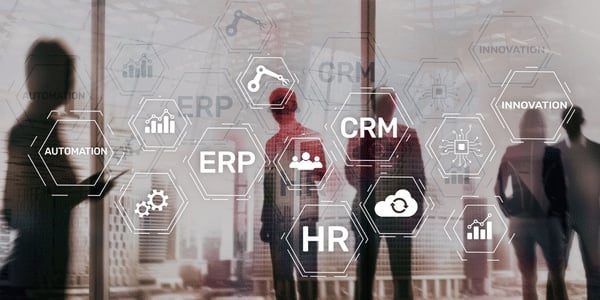The food business in Singapore is thriving, with local production expanding and even reaching international markets. From cleaning and sorting to packaging and distribution, every stage in food manufacturing demands precision and consistency. Without the right system, managing these processes can quickly become overwhelming.
We believe ERP software is critical for food manufacturers because it centralizes control across all operations. With an integrated platform, businesses can automate workflows, maintain food safety, adapt to consumer trends, and strengthen supply chain management. It ensures complete oversight, covering everything from production and quality control to finance and human resources.
To remain competitive in a demanding market, food businesses need technology that streamlines operations and drives growth. You can start by exploring a free demo from HashMicro to see how our ERP solution can simplify food production. Keep reading to discover why food manufacturing ERP software is becoming indispensable for the industry.
Key Takeaways
|
Why We See ERP as Essential for Food Manufacturing
Food manufacturers frequently face a challenge that forces them to produce high-quality products and provides excellent service to increase customer value. As your manufacturing company expands, so should its operating system. You can increase customer satisfaction by processing orders quickly and efficiently with the best method. Furthermore, with an integrated approach, customers can track the status of their orders through traceability and data transparency.
Today, there is a real need for technology to help factories run more smoothly and intelligently. In addition, given the dominance of digitalization in today’s business. The food manufacturing industry should consider switching to automation of production processes and the advantages of using an integrated ERP system. For company growth, you must understand why companies should invest in ERP Systems designed with efficiency, security, accountability, and food manufacturing in mind. ERP system modernization is intended to improve the company’s specific business. The ERP system will automate the company’s core functions, resulting in greater efficiency and accuracy in every job.
Also Read: The Ways Improving Your Food Production Business with Application
Key Benefits You Gain from Food-Specific ERP

Food manufacturing ERP Software has numerous advantages for your company, including improved business performance, increased company growth, and reduced working capital. You have compelling reasons to invest in food manufacturing ERP software to ensure your company’s long-term success. Take a closer look at some key advantages of incorporating a food-specific ERP system. The following are the primary advantages of purchasing food manufacturing ERP software:
1. Reduce cost
Implementing an ERP system in the food manufacturing industry can significantly reduce operating costs. The company can know every cost it has incurred thanks to responsible control and software integration into its systems to cut down on the money wasted while incurring the costs. Consequently, you can accurately identify and cut operational costs if you use ERP software.
2. Optimize company operations
Food manufacturing can cut costs and discover additional ways to boost the company’s overall efficiency if you use ERP software tailored to the food industry. Implementing ERP software can also shorten the time needed for processing, make collaboration more effective, and give the entire organization real-time access to data, all of which will optimize performance.
ERP software will ensure that all processes run as they should and help identify problems before they spiral out of control. ERP software will also help ensure that all processes run as expected.
3. Increase flexibility
Increasing the company’s operational flexibility can be accomplished through investment in an ERP system. Food companies can benefit from a customized enterprise resource planning system that caters to their unique requirements, products, and objectives. When it comes to the optimal development of the company, the ERP system will significantly assist as the business expands.
ERP software for the food manufacturing industry is a solution that can better optimize business management. The implementation of an ERP system offers long-term benefits that are beneficial to the expansion of a business.
What We Believe Defines Great Food ERP Software

The implementation of effective enterprise resource planning (ERP) software is essential to the prosperity and productivity of a food manufacturing company; however, what characteristics set one ERP system apart from another? Let’s look at some of the essential attributes of the best food-manufacturing ERP Software:
1. End-to-end management
ERP Software hosted in the cloud simplifies managing the various moving parts of food manufacturing. Because the software is integrated into a single centralized system, it can move data and workflows from various independent platforms effortlessly. You will have simple access to the integrity of the data and the ability to manage production, control quality, estimate, and perform many other tasks. ERP software lets users view all operations at once and quickly pull reports, find lot numbers, and recognize potential issues.
2. Real-time reporting capabilities and centralized database
Competing in today’s modern food manufacturing industry necessitates having timely access to accurate data. With a fully integrated software solution, cloud-based ERP software allows users to run reports automatically and accurately, update numbers in real-time, and access data anytime and anywhere.
Furthermore, food-specific ERP can keep food manufacturing business data organized and secure so that employees have access to all employees’ knowledge bases in a centralized ERP software.
3. Simplified safety measures
Each ERP software implements a unique set of safety precautions; they are all different. Pick a solution that can provide direct authorization and user permissions on all supported platforms. Because of this, the likelihood of a breach or unauthorized access is decreased.
4. Intuitive user experience
Implementing a new system can be daunting for executives and floor workers. However, the right ERP system should be simple and intuitive for all employees, reducing friction and shortening the learning curve. Employees are more likely to stick to protocols outlined in the system rather than take shortcuts or revert to outdated processes if the system is easy to learn and use.
Also Read: Best ERP Software in Singapore – Explore the best software options available this year and find the right fit for your business needs.
Conclusion
ERP software is critical for a company’s progress in today’s digital era, where efficiency is one of the essential factors in the company’s success. Utilizing ERP Software benefits food manufacturing companies’ automation from the planning stage to the final sales stage. To reap these advantages, you must use the best ERP software for automating food manufacturing production processes. HashMicro’s ERP software offers automation solutions for your business. You can request a free demo of our best ERP software.
Warning: Undefined array key "med" in /home/hashmicr/public_html/blog/wp-content/plugins/insert-headers-and-footers/includes/class-wpcode-snippet-execute.php(419) : eval()'d code on line 281

FAQ about Food Manufacturing ERP Software
-
How does ERP help with food compliance and regulations?
ERP systems can track ingredients, batches, and expiration dates, ensuring compliance with food safety regulations like HACCP or ISO standards. This helps reduce the risk of recalls and supports audits.
-
Can ERP software support seasonal demand in food manufacturing
Yes. ERP allows forecasting and inventory planning based on sales data, which helps food businesses prepare for seasonal spikes in demand without overstocking or underproducing.
-
What role does ERP play in reducing food waste?
By tracking inventory levels in real-time and monitoring expiration dates, ERP helps minimize waste. Manufacturers can use this data to optimize purchasing and production schedules.
-
Does ERP integrate with supply chain partners in the food industry?
Many ERP systems include supplier and logistics integration, allowing food businesses to share real-time data with vendors and distributors for better coordination and faster delivery.

































